

Ahimsa Day 2016 celebrated on 18th October in the Atlee Suite, Portcullis House, House of Commons London differed from past Ahimsa Day celebrations in that it commenced with the formal launch of OneJAIN All Party Parliamentary Group (OneJAIN APPG).
This event of the Institute was held under the auspices of the OneJAIN APPG and so could be held in the Atlee Suite which otherwise requires a long booking process. The event was fully subscribed with over 160 guests present, including Lords, MPs, leaders and prominent members from the Jain community and Inter faith leaders.
The Compére for the evening, Seeta Haria introduced herself as the Vice President at the Macquarie Group in the City of London. She  invited the Respected Samnijis to recite the auspicious Navkar mantra so that the proceedings for the evening could commence. Samnijis recited the mantra in their melodious voices.
invited the Respected Samnijis to recite the auspicious Navkar mantra so that the proceedings for the evening could commence. Samnijis recited the mantra in their melodious voices.
Seeta then invited Nemu Chandaria OBE Chairman of the Institute to formally welcome the guests. He welcomed the guests expressed his pleasure on seeing a large attendance particularly the Lords and MPs.
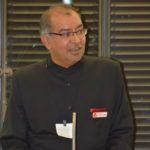 Dr Mehool Sanghrajka, Director of the Institute who was instrumental in the formation of the OneJAIN APPG was the next speaker. He gave a brief background on how OneJAIN came in to being and the reason for forming the APPG for the Jain community. Names of the members of the APPG were mentioned including the Chairperson Gareth Thomas. View full address.
Dr Mehool Sanghrajka, Director of the Institute who was instrumental in the formation of the OneJAIN APPG was the next speaker. He gave a brief background on how OneJAIN came in to being and the reason for forming the APPG for the Jain community. Names of the members of the APPG were mentioned including the Chairperson Gareth Thomas. View full address.
Mr Gareth Thomas, Member of Parliament for Harrow West expressed his pleasure at having got the 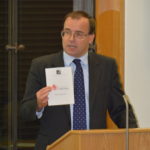 opportunity to form the APPG for Jains and be its first Chairperson. He went on to say that his constituency had a very large number of Jain residents and he was in contact with many of them. Earlier that evening he had mingled with the audience to ascertain how many had come from Harrow West. Mr Thomas has been a long-time supporter of the Community and is seen at many of its annual events.
opportunity to form the APPG for Jains and be its first Chairperson. He went on to say that his constituency had a very large number of Jain residents and he was in contact with many of them. Earlier that evening he had mingled with the audience to ascertain how many had come from Harrow West. Mr Thomas has been a long-time supporter of the Community and is seen at many of its annual events.
Keynote Speaker for the evening, Mr Bill Liao was scheduled to arrive on 5pm train from Brussels but due to some technical problems all Channel Tunnel trains had been cancelled and his apology was received just after the start of the event.
Kumar Mehta, another Director from the Institute was called to announce the winner of the IoJ Ahimsa Award 2016 after highlighting our reasons for selecting his name as the winner.
Kumar started with a description of a village in Rajesthan, Western India. A hot sun beating down on a dry and barren earth. Desert and scrub is all you can see. The 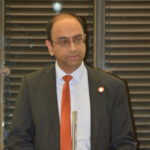 men of the village have gone out to distant towns to find work, and the women are walking miles each day just to fetch firewood and water. Many years of deforestation and mining, combined with minimal rainfall has depleted water supplies. No streams are flowing and the village wells have gone dry. Farming activities have all but stopped as little grows. Similar situation existed in thousands of villages.
men of the village have gone out to distant towns to find work, and the women are walking miles each day just to fetch firewood and water. Many years of deforestation and mining, combined with minimal rainfall has depleted water supplies. No streams are flowing and the village wells have gone dry. Farming activities have all but stopped as little grows. Similar situation existed in thousands of villages.
A young and eager social activist with a passion for improving village life, Rajendra Singh arrived in 1985. His desire to change the environment knew no bounds and in a matter of few years he had the water flowing again in the river that had been dry for over thirty years. Understanding the tradition that had been developed over the centuries to recharge the water levels and reapplying it brought the life back to the dying village. The work done was with active participation of the villagers both financially and in provision of labour
The success at Gopalpura motivated Rajendra Singh and his team started going from village to village training the villagers on desilting the river and recharging the water table to make the river flow again.
The restoration of the water table, and flowing water, transformed the villages and the landscape. People began to return to abandoned villages, the soil became moist, and land available for cultivation increased.
The farming activities resumed, with enough water for the cattle to produce milk and work the fields. Water was available within easy reach and women no longer need to track long distances.
The villagers had turned their fortunes. In these dry areas, water is often the dividing line between poverty and prosperity.
To sustain progress, village committees were setup to manage community resources. Many ran projects for reforestation and lobbied to prevent exploitation by commercial interests or inappropriate policy.
In the 30 years since Rajendra Singh first picked up a shovel in Rajasthan, over 10,000 johads and other water harvesting structures have been built, and water has been restored to over 1,000 villages. The landscape has been transformed and several rivers that had not flowed for many decades are flowing again all year round.
Rajendra Singh is a compassionate and determined humanitarian who has dedicated himself to helping the less fortunate improve their lives.
His innovative work in Rajesthan has changed the fortunes of hundreds of thousands people across huge areas. He has shown the value of simple, inexpensive and time tested methods of working with nature in a sustainable way. He firmly upholds the principle that if you take care of the earth, it will take care of you.
His work also provides a model for social empowerment and action in the face of the environmental changes that are taking place. He has demonstrated the effectiveness of Gandhi’s vision of Swaraj through the motivation and self-determination of villagers in water matters that impact their communities.
His work points the way to solving water issues in other parts of the world that can help reduce hardship and conflict. He is actively working to share these ideas and methods across the world, both rich and poor, including flood management here in the UK.
In 2008, The Guardian newspaper named him amongst its list of “50 people who could save the planet”.
In 2015, he was the named the Stockholm Water Prize Laureate – which is known as the “Nobel prize for water”.
He is commonly hailed as the “Waterman of India”, or even “Water Gandhi”.
We congratulate him for his life-long dedication to this amazing work, his compassion for those in need, his message of sustainable living to the world and his leadership in taking these ideas forward for peace and the well-being of the planet.
He is clearly the embodiment of ahimsa in action.
We wish him success for the work he continues to do in India and around the world.
Mr Rajendra Singh was declared the IoJ Ahimsa Award2016.
Lord Bourne of Aberystwyth, Minister of State for the Department of Communities and Local Government was requested to present the award to Mr Singh.
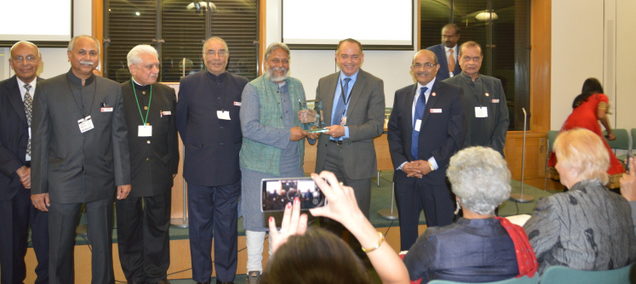
Mr Singh was then invited to address the audience. He thanked the Institute in selecting him for the award and inviting him to the UK to receive it. He recalled his early days as the young man whom nobody wanted to listen to but how he had to force his views and thoughts to get them acted upon. He personally handled the shovels to inspire others to do the same. During his career spanning over thirty years he has rubbed many a persons particularly from the State Ministries on the wrong side and has been threatened with lawsuits and even imprisonment. However, he was proven right in his actions and his forceful actions did bring the results he had predicted.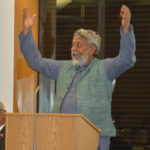
He has been advising both the Central Government and the State Government in Rajesthan on various issues and generally his opinions are well respected. He has been to the UKa couple of times to give advise on flood management issues.
He has been working with the United Nations as an advisor on water issues.
His passion was for ensuring the welfare of the poor was very much in evidence in his talk – whilst his gestures demonstrated his enthusiasm for the work he was doing.
Lord Bourne who was scheduled to stay for 30 to 40 mins had spent over an hour
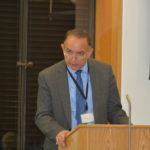 as listening to Mr Singh proved to be very interesting. His Lordship was invited to address the audience. He emphasised the importance of clean water as the vital building block for life. He went on to how Mr Singh had spent his life twinning the his knowledge of the local area and the modern technology and made life thrive in some of the driest areas of India. He congratulated Mr Singh and wished him success in his work to benefit the communities in India and in the wider world.
as listening to Mr Singh proved to be very interesting. His Lordship was invited to address the audience. He emphasised the importance of clean water as the vital building block for life. He went on to how Mr Singh had spent his life twinning the his knowledge of the local area and the modern technology and made life thrive in some of the driest areas of India. He congratulated Mr Singh and wished him success in his work to benefit the communities in India and in the wider world.
“Clean water is a vital building block for life and Rajendra Singh’s work has made life thrive in some of the driest areas of India.
“He has spent his life improving the quality of water in Rajasthan by twinning his knowledge of the area with modern technology and problem-solving abilities.
“This hard work and compassion is at the heart of many faiths the world over. We have seen this in Britain too, where faith plays its part in supporting social care and welfare; bringing people closer; delivering more integrated communities.
“I would like to thank the Jain community and offer my congratulations to Mr Rajendra Singh, I hope your hard work continues to benefit communities in India and the wider-world long into the future.” Read press release by the Dept of LocalGovernment & Communities .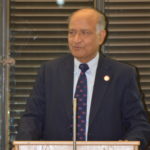
Several speakers followed Lord Bourne – amongst them Mr CB Patel, Managing Editor of Asian Voice and Gujarat Samachar – the leading newspapers amongst the Asian media. He spoke at length about his appreciation of the Jain community, their achievements and his close association with the Institute. He congratulated Mr Singh and highlighted the need for several watermen in India to alleviate the perennial problems related with shortage of water.
Lord Dholakia, who had earlier in the evening agreed to be the one of the Vice Chairs for the OneJAIN APPG, praised the work of the IOJ in 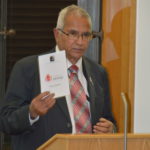 establishing the APPG for Jainism and spoke of the importance of Jains joining the political class of the country so that Jain principles can be brought into the debates that shape policy. He said that there were too few Jains at the present time, and he looked forward to the time when many more will come forward. He reiterated the significant role played by Jainism in propagating the philosophy of ahimsa, non-violence in India and the rest of the world, and that Jains in the UK should find ways of putting ahimsa into action at every level.
establishing the APPG for Jainism and spoke of the importance of Jains joining the political class of the country so that Jain principles can be brought into the debates that shape policy. He said that there were too few Jains at the present time, and he looked forward to the time when many more will come forward. He reiterated the significant role played by Jainism in propagating the philosophy of ahimsa, non-violence in India and the rest of the world, and that Jains in the UK should find ways of putting ahimsa into action at every level.
Mr Rajan, the Minister for Coordination from the Indian High Commission in London spoke briefly to congratulate the IOJ on selecting, in his  opinion, a most worthy wi
opinion, a most worthy wi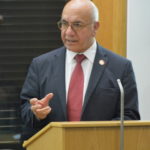 nner of the prestigious Ahimsa Award, recalling the need for the restoration of rivers in his state, Tamil Nadu, in India. He wished Rajendra Singh further success in his valuable endeavours.
nner of the prestigious Ahimsa Award, recalling the need for the restoration of rivers in his state, Tamil Nadu, in India. He wished Rajendra Singh further success in his valuable endeavours.
Other speakers included Mr Virendra Sharma MP – a staunch supporter of the Institute, Mr Navin Shah – most senior Jain to be involved in 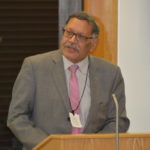 politics – currently a member of the GLA and Sachin Shah a young and enthusiastic Jain politician and the leader of Harrow Council.
politics – currently a member of the GLA and Sachin Shah a young and enthusiastic Jain politician and the leader of Harrow Council.

To conclude the evening, Mr Kanti Shah, Institute’s Director and Secretary gave the vote of thanks to the invited guests, the speakers, Gareth
Thomas MP’s office staff and the Portcullis staff who all helped in making the event a grand success it was.

